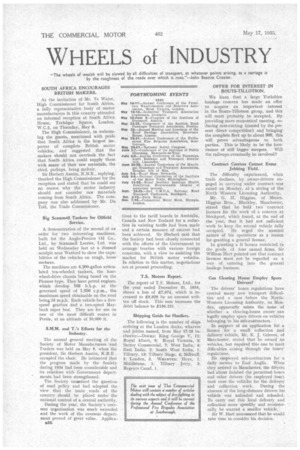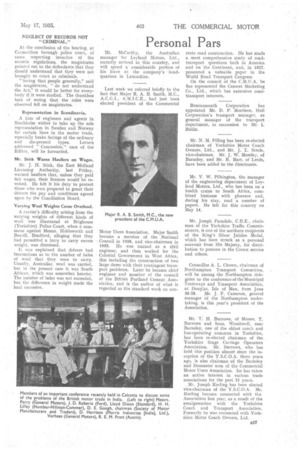WHEELS of INDUSTRY
Page 26

Page 27

If you've noticed an error in this article please click here to report it so we can fix it.
"The wheels of wealth will be slowed • by the roughness of
by all difficulties of transport, at whatever points arising, as a carriage is the roads over which it runs."—John Beattie Crozier.
SOUTH AFRICA ENCOURAGES BRITISH MAKERS.
At the invitation of Mr. Te Water, High Commissioner for South Africa, a fully representative body of motor manufacturers rn this country attended an informal reception at South Africa House, Trafalgar Square, London, W.C1, on Thursday, May 9.
The High Commissioner, in welcoming the guests, mentioned with pride that South Africa is the largest importer of complete British motor vehicles, and suggested that the makers should not overlook the fact that South Africa could supply them with many of their raw materials, the chief, perhaps, being mohair. Sir Herbert Austin, K.B.E., replying, thanked the High Commissioner for the reception and stated that he could see no reason why the motor industry should not consider raw materials coming from South Africa. The company was also addressed by Mr. Du Toit, the Trade Commissioner.
Big Scamtneff Tankers for Oilfield Service.
A demonstration of the second of an order for two interesting machines, built for the Anglo-Persian Oil Co., Ltd., by Scammell Lorries, Ltd. was held on Wednesday last at a disused sandpit near Watford to show the capabilities of the vehicles on rough, loose surfaces.
The machines are 4,200-gallon articulated ten-wheeled tankers, the. fourwheel-drive chassis being based on the Pioneer type, They have petrol engines, which develop 168 b,h.p. at the governed speed of 1,650 r.p.m., the maximum speed obtainable on the road being,34 m.p.h. Each vehicle has a fivespeed gearbox and a two-speed Maybansuper box. They are for use on one of the most difficult routes in Persia, at an altitude of 10,000 ft.
S.M.M. and T.'s Efforts for the Industry.
The annual general meeting of the Society of Motor Manufacturers and Traders was held on May 9, when the president, Sir Herbert Austin, K.B.E., occupied the chair. He intimated that the progress made by the Society during 1934 had been considerable and its relations with' Government departments had been strengthened.
The Society exaanined the question of road policy and had adopted the view that the main roads of the country should be placed under the national control of a central authority.
During the year, the Society's overseas organization was much extended and the work of the overseas departmeat proved of great value. Applica
tions to the tariff boards in Australia. Canada and New Zealand for a reduction in existing tariffs had been made and a certain measure of success had been achieved. Sir Herbert said that the Society had been closely connected with the efforts of the Government to arrange treaties with various foreign countries, with a view to assisting the market for British motor vehicles. In relation to this matter, negotiations are at present proceeding.
T.S. Motors Report.
The report of T.S. Motors, Ltd., for the year ended December 31, 1934, shows a loss of £7,974, which is increased to £9,920 by an amount written off stock. This sum increases the debit balance to £156,231.
Shipping Guide for Hauliers.
The following is the number of ships arriving at the London docks, wharves and jetties named, from May 17-25 inclusive:—DocKs: King George V, 11; Royal Albert,9; Royal Victoria, Surrey Commercial, 7; West India, 4; East India, 2: South West India, 1; Tilbury, 13; Tilbury Stage, 4;
5; London, 3.. WHARVES: Hays, 1; Middletons, I; Tilbury Jetty, 3; Regents Canal, I. OFFER FOR INTEREST 1N BOUTS-T1LLOTSON.
We learn that a large Yorkshire haulage concern has made an offer to acquire an important interest in the Bouts-Tillotson group, and this will most probably be accepted. By providing more economical running, reducing rate-cutting (caused by the present direct competition) and bringing the complete fleet up to about 900, this will prove advantageous to both parties. This is likely to be the forerunner of still bigger mergers. Will the railways eventually be involved?
Contract Carriers Cannot Enter Jobbing Field.
The difficulty experienced, when trade declines, by owner-drivers engaged in carrying under contract was raised on Monday, at a sitting of the North Western Licensing Authority.
Mr. G, H. Higgins, of Messrs. Higgins Bros., Blackley, Manchester, stated that he held two •contract licences for the work of a concern at Stockport, which found, at the end of the 'year, that it had not sufficient. work to keep the second vehicle fully occupied. He urged the unusual nature of his operations as a reason for granting a general licence.
In granting a B licence restricted to the goods of four named firms, Sir William Hart pointed out that contract licences must not be regarded as a way of entering into the general haulage business.
Can Clearing House Employ Spare Drivers?
The drivers' hours regulations have created many new transport difficulties and a case before the NorthWestern Licensing Authority, on Monday, apparently raises the issue'of whether a clearing-house owner. can legally employ spare drivers on vehicles belonging to his sub-contractors.
In support of an. application for: a licence for a small collection and delivery vehicle, Mr, E. J. Grieves, of Manchester, stated that he owned no vehicles, but required this one to meet difficulties arising through the hours' regula Lions • .
_He employed sub-contractors for a daily service to EaSt Anglia. When they arrived in Manchester, the drivers bad about finished the permitted, hours ancl other drivers (he employed four) took over the vehicles for the delivery and collection work, During the absence of the long-distance drivers his vehicle was unloaded and reloaded. To carry out this local deliveiy and collection more speedily and economically he wanted A smaller vehicle,' Sir W. Hart announced that be would take time to consider his decision.
NEGLECT OF RECORDS NOT "CRIMINAL."
At the conclusion of the hearing, at Carmarthen borough police court, of cases respecting breaches of the records regulations, the magistrates pointed out to the defendants that they should understand that they were not brought to court as criminals.
'Seeing that people generally," said the magistrates, " do not understand the Act," it would be better for everybody if it were studied. The thankless task of seeing that the rules were observed fell on magistrates.
Representation in Scandinavia.
A firm of engineers and agents in Stockholm wishes to take up the sole representation in Sweden and Norway for certain lines in the motor trade, especially brake facings of the ordinary and die-pressed types. Letters addressed " Concession," care of the Editor, will be forwarded.
Mr. Stirk Warns Hauliers on Wages.
Mr. J. H. Stirk, the East Midland Licensing Authority, last Friday, warned hauliers that, unless they paid fair wages, their licences wouldbe revoked. He felt it his duty to protect those who were prepared to grant their drivers the pay and conditions agreed upon by the Conciliation Board.
Varying Wool Weights Cause Overload.
A carrier's difficulty arising from the varying weights of different kinds of wool was illustratcl at Brighouse (Yorkshire) Police Court, when a summons against Messrs. Holdsworth and Burrill, Bradford, alleging that they had permitted a lorry to carry excess weight, was dismissed.
It was explained that drivers had instructions as to the number of bales of wool that they were to carry. Usually, Australian wool was carried, but in the present case it was South African, which was somewhat heavier. The number of hales was not exceeded, but the difference in weight made the load excessive.






















































































